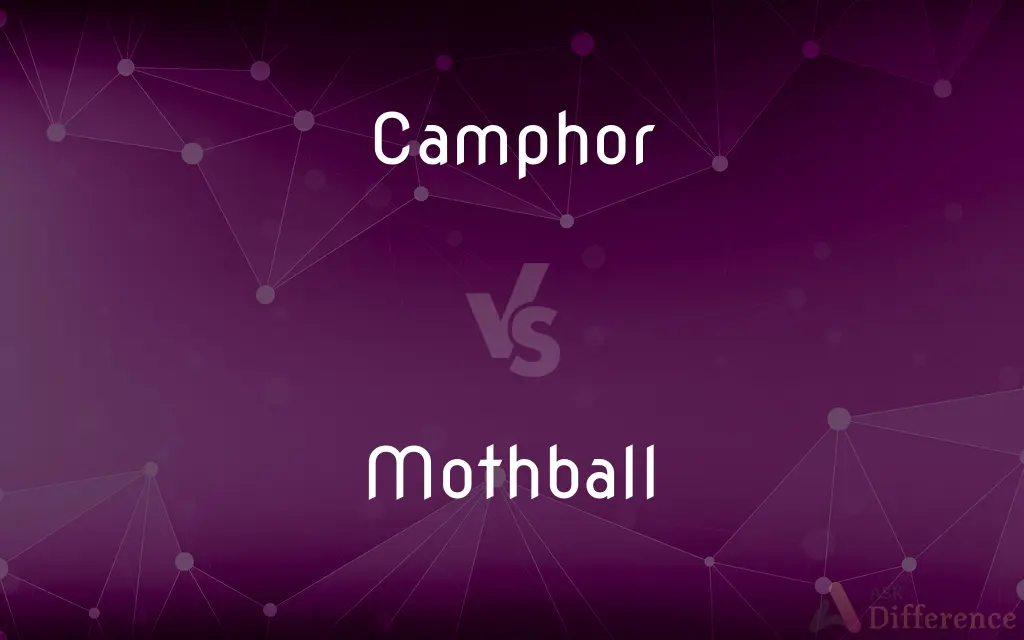Camphor vs. Mothball — What's the Difference?
By Tayyaba Rehman — Updated on September 18, 2023
Camphor is a white, volatile substance with a strong aroma, used for various purposes including medicine and flavoring. Mothballs are small balls of chemical pesticide and deodorant used to protect clothes from moths.

Difference Between Camphor and Mothball
Table of Contents
ADVERTISEMENT
Key Differences
Camphor is a crystalline substance obtained from the wood of the camphor tree. It is widely used for its aromatic properties, and also as a plasticizer in the production of celluloid and other materials. Mothballs, on the other hand, are small balls made primarily of naphthalene or paradichlorobenzene designed to repel or kill moths in stored clothing.
While camphor has a broad range of uses that include acting as a flavoring agent, in medicinal creams, and in religious rituals, mothballs are specifically intended for preserving fabrics from the damaging effects of moths. Thus, the main difference lies in the range of applications: Camphor is versatile, whereas mothballs have a very specialized use.
From a grammatical standpoint, "camphor" is almost exclusively used as a noun in sentences. Mothballs also primarily appear as a noun in language use but can sometimes be used as a verb in the phrase "to mothball," meaning to put something into storage or to postpone it indefinitely.
In terms of safety, both camphor and mothballs should be handled carefully. Camphor can be toxic when ingested in large quantities and can cause skin irritation. Mothballs, being a pesticide, are also toxic and should not be ingested or come into prolonged contact with skin.
Comparison Chart
Primary Use
Medicinal, flavoring, rituals
Protecting clothes from moths
ADVERTISEMENT
Chemical Composition
Camphor
Naphthalene or Paradichlorobenzene
Part of Speech
Noun
Noun, Verb ("to mothball")
Safety
Toxic when ingested, skin irritant
Toxic when ingested
Aroma
Strong, medicinal aroma
Chemical, often unpleasant smell
Compare with Definitions
Camphor
Used as a plasticizer in manufacturing.
Camphor is an essential ingredient in some types of celluloid.
Mothball
A small ball used to protect clothes from moths.
She placed mothballs in her winter coat storage box.
Camphor
A white, crystalline substance with aromatic properties.
She added camphor to the homemade ointment.
Mothball
Contains chemical pesticides.
Mothballs are made of naphthalene or paradichlorobenzene.
Camphor
Has spiritual significance in certain religious rituals.
Camphor was burned during the ceremony.
Mothball
Toxic when ingested.
Keep mothballs away from pets and children.
Camphor
Employed in traditional medicine.
Camphor oil can relieve skin irritation.
Mothball
To remove (a ship, for example) from active service or use and put into protective storage.
Camphor
Camphor () is a waxy, flammable, transparent solid with a strong aroma. It is a terpenoid with the chemical formula C10H16O. It is found in the wood of the camphor laurel (Cinnamomum camphora), a large evergreen tree found in East Asia; and in the related kapur tree (Dryobalanops sp.), a tall timber tree from South East Asia.
Mothball
Can be used as a verb to mean "put into storage."
They decided to mothball the project.
Camphor
A fragrant white or colorless crystalline ketone, C10H16O, obtained naturally from the wood of the camphor tree or synthesized from pinene and used as an insect repellent, in the manufacture of film, plastics, lacquers, and in medicine chiefly in external preparations to relieve mild pain and itching.
Mothball
Mothballs are small balls of chemical pesticide and deodorant, sometimes used when storing clothing and other articles susceptible to damage from mold or moth larvae (especially clothes moths like Tineola bisselliella).
Camphor
(organic compound) A white transparent waxy crystalline isoprenoid ketone, 1,7,7-trimethylbicyclo[2.2.1]heptan-2-one, with a strong pungent odour, used in pharmacy.
Mothball
A marble-sized ball, originally of camphor but now of naphthalene, stored with clothes to repel moths.
Camphor
A tough, white, aromatic resin, or gum, obtained from different species of the Laurus family, esp. from Cinnamomum camphara (the Laurus camphora of Linnæus.). Camphor, C10H16O, is volatile and fragrant, and is used in medicine as a diaphoretic, a stimulant, or sedative.
Mothball
A condition of long storage for possible future use
Put the battleship into mothballs.
Camphor
Originally, a gum resembling ordinary camphor, obtained from a tree (Dryobalanops aromatica formerly Dryobalanops camphora) growing in Sumatra and Borneo; now applied to its main constituent, a terpene alcohol obtainable as a white solid C10H18O, called also Borneo camphor, Malay camphor, Malayan camphor, camphor of Borneo, Sumatra camphor, bornyl alcohol, camphol, and borneol. The isomer from Dryobalanops is dextrorotatory; the levoratatory form is obtainable from other species of plants, and the racemic mixture may be obtained by reduction of camphor. It is used in perfumery, and for manufacture of its esters. See Borneol.
Mothball
A condition of being set aside or discarded
Have put the plan into mothballs.
Camphor
To impregnate or wash with camphor; to camphorate.
Mothball
To defer indefinitely; shelve
Mothball a project.
Camphor
A resin obtained from the camphor tree; used in making celluloid and liniment
Mothball
A small ball of chemical pesticide (typically naphthalene) and deodorant placed in or around clothing and other articles susceptible to damage from mold or moth larvae in order to protect them from this damage.
Camphor
Acts as a flavoring agent.
Camphor is used sparingly in some culinary traditions.
Mothball
(transitive) To store or shelve something no longer used.
They mothballed the old version after the new one came out.
Mothball
To stop using (something), but keep it in good condition.
Mothball
A small sphere of camphor or naphthalene used to keep moths away from stored clothing.
Mothball
To put into long-term storage; as, to mothball the battleships not needed after the war.
Mothball
A small sphere of camphor or naphthalene used to keep moths away from stored clothing
Mothball
Put into long-term storage
Mothball
Emanates a strong, chemical smell.
The closet smelled of mothballs.
Common Curiosities
Can you use Camphor instead of Mothballs?
Though both may repel moths, they have different primary uses and safety profiles.
What is Camphor used for?
Camphor is used in medicine, flavoring, and religious rituals.
Is Camphor edible?
Camphor should not be ingested as it can be toxic.
Are Mothballs toxic?
Yes, they contain toxic chemicals like naphthalene or paradichlorobenzene.
Is Camphor natural or synthetic?
It can be either; natural camphor is extracted from trees, and synthetic forms are also available.
What is a Mothball used for?
Mothballs are used to protect clothes from moths.
What part of speech is Camphor?
Camphor is primarily used as a noun.
Can Camphor be used on skin?
Yes, but in diluted form as it can cause irritation.
Is Camphor used in cooking?
It is used sparingly in some culinary traditions but must be food-grade.
How do Camphor and Mothball differ in smell?
Camphor has a medicinal aroma, while mothballs have a strong, chemical smell.
What are Mothballs made of?
Naphthalene or paradichlorobenzene.
Can Mothball be used as a verb?
Yes, as in "to mothball" something, meaning to put it into storage.
Are Mothballs flammable?
Yes, they can be flammable.
Can Mothballs be used around pets?
No, they are toxic and should be kept away from pets.
Can you use Mothballs outside?
They are generally not recommended for outdoor use due to their toxicity.
Share Your Discovery

Previous Comparison
Applaude vs. Applause
Next Comparison
Discomfort vs. UncomfortableAuthor Spotlight
Written by
Tayyaba RehmanTayyaba Rehman is a distinguished writer, currently serving as a primary contributor to askdifference.com. As a researcher in semantics and etymology, Tayyaba's passion for the complexity of languages and their distinctions has found a perfect home on the platform. Tayyaba delves into the intricacies of language, distinguishing between commonly confused words and phrases, thereby providing clarity for readers worldwide.















































